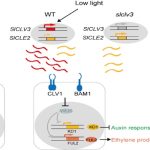Shuangcheng He: Plant Physiology First Author

 Shuangcheng He, first author of “The MYB59 Transcription Factor Negatively Regulates Salicylic Acid- and Jasmonic Acid-Mediated Leaf Senescence”
Shuangcheng He, first author of “The MYB59 Transcription Factor Negatively Regulates Salicylic Acid- and Jasmonic Acid-Mediated Leaf Senescence”
Current Position: Ph.D. student
Education: 2015.09 to 2019.06, College of Agronomy, Northwest A&F University (Bachelor); 2019.09 to present, College of Agronomy, Northwest A&F University (Ph.D. student)
Non-scientific Interests: Gas volleyball, listening to music
Brief bio: In 2019, I was recommended to the Rapeseed Heterosis and Bio-breeding Team of the College of Agronomy. Under the guidance of professor Mingxun Chen, the key factors and mechanisms regulating leaf development and seed oil accumulation in Rapeseed were studied. Relevant research was published in the Journal of Agricultural and Food Chemistry (2022). In the present study, we showed that MYB59 functions as a negative regulator of leaf senescence in A. thaliana. We found that MYB59 directly suppressed SAG18 expression and indirectly inhibited the expression of other SAGs to repress leaf senescence. On the other hand, MYB59 was induced by SA and JA, and inhibited SA production by directly repressing the expression of ICS1 and PAL2 and restrained JA biosynthesis by directly suppressing LOX2 expression, thus forming two negative feedback regulatory loops with SA and JA, ultimately delaying leaf senescence. Our study provides insights into the regulatory mechanism of leaf senescence and lays a foundation for breeding stay-green cultivars to improve crop productivity through biotechnological strategies.
论文:The MYB59 Transcription Factor Negatively Regulates Salicylic Acid- and Jasmonic Acid-mediated Leaf Senescence
姓名:何双呈
目前职位:西北农林科技大学在读博士研究生
教育经历:2015.09-2019.06,西北农林科技大学农学院(学士);2019.09至今,西北农林科技大学农学院(硕博连读)
兴趣爱好:气排球,听音乐
个人简介:我于2019年保送至农学院油菜杂种优势与生物技术育种团队,在导师陈明训教授的指导下,鉴定调控叶片发育和种子油脂积累的关键因子并解析其调控机制。相关研究发表于Journal of Agricultural and Food Chemistry(2022)上。在本研究中,我们鉴定到一个拟南芥叶片衰老的负调控因子MYB59。我们发现MYB59一方面通过直接抑制SAG18的表达以及间接抑制其它SAGs的表达从而负调控叶片衰老。另一方面,MYB59的表达受到水杨酸和茉莉酸的诱导,并且通过直接抑制水杨酸合成基因ICS1和PAL2以及茉莉酸合成基因LOX2的表达,从而抑制叶片中水杨酸和茉莉酸的积累,进而与水杨酸和茉莉酸形成两个负反馈调节回路,最终抑制叶片的衰老。本研究为植物叶片衰老的调控机制提供了新的见解,为通过生物技术培育持绿品种提高作物产量奠定了基础。



